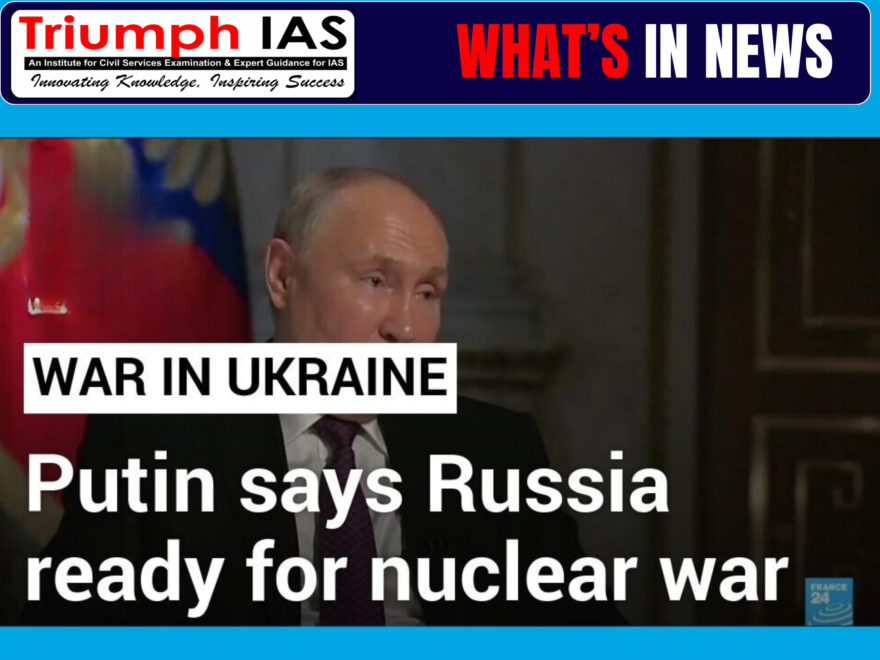Unseen Shadows: The Hidden Impact of Nuclear Weapons
| For Prelims : Quick Facts For Prelims , GS Paper 2 , International Treaties & Agreements, International Relation For Mains : Impact of Nuclear Weapons , Non-Proliferation Treaty, Comprehensive Nuclear Test Ban Treaty (CTBT) |
Why in News
Recently Russian President Vladimir Putin issued a stern warning to Western powers on Wednesday, stating that Moscow is ready for nuclear conflict at a technical level. Putin stressed that any deployment of US troops to Ukraine would be seen as a significant escalation of the ongoing conflict. This statement comes just ahead of the March 15-17 elections, where Putin is widely expected to secure another six-year term in office
What happens if nuclear weapons are used?
Immediate impacts
A single nuclear weapon can devastate a city, killing most residents. Multiple nuclear explosions in cities could lead to tens of millions of deaths. In a US-Russia nuclear war, casualties could reach hundreds of millions. The fireball from a blast reaches full size in about 10 seconds, releasing energy as blast, heat, and radiation. A fast shockwave causes immediate deaths, lung damage, and injuries from collapsing structures and flying debris. Intense thermal radiation vaporizes everything near the blast, causing severe burns and igniting fires. Even those in underground shelters face death from lack of oxygen and carbon monoxide poisoning.
Long-term effects
Nuclear weapons produce ionizing radiation in the long term, leading to illness, environmental contamination, and health issues like cancer and genetic damage. Atmospheric nuclear tests from 1945 to 1980 are projected to cause 2.4 million cancer deaths. Using less than one percent of the world’s nuclear weapons could disrupt the climate, threatening two billion with starvation in a nuclear famine. Thousands of detonated nuclear weapons could trigger a nuclear winter, devastating the ecosystem.
Medical professionals and responders would struggle in radioactive areas post-nuclear detonation. A single blast in a city would strain relief efforts, while a nuclear war would overwhelm any prepared relief system. Displaced populations from a nuclear war would create an unprecedented refugee crisis.
Environmental and socio-economic impact
The presence of nuclear weapons significantly affects the environment, potentially leading to climate disruption, a nuclear winter, global famine, and worsened global warming effects in the event of a nuclear war. The socio-economic repercussions would be severe, particularly impacting developing nations and marginalized communities. Nuclear weapons drain financial resources that could otherwise be allocated to beneficial areas like green technologies and healthcare facilities during their development, upkeep, and disposal.
Nuclear Weapons: A Global Threat:
These weapons cause immense death and destruction, primarily harming innocent civilians. Radiation exposure has severe health consequences, impacting current and future generations. Nuclear war could trigger a “nuclear winter,” disrupting ecosystems and threatening global food security. Disaster response would be inadequate, creating a refugee crisis of unprecedented scale.
International Treaties & Agreements
- Non-Proliferation Treaty
The Eighteen Nation Committee on Disarmament, a UN-sponsored organization in Switzerland, drafted a treaty. The US bombed Hiroshima and Nagasaki with atomic bombs on August 6th and 9th, 1945, ending World War 2 but causing casualties of 129,000 to 226,000. The aftermath raised concerns about nuclear weapon misuse, leading to the call for a Nuclear Arms Control treaty. In 1961, a UN resolution initiated the Non-Proliferation Treaty to prevent a nuclear arms race.

- Comprehensive Nuclear Test Ban Treaty (CTBT)
The CTBT is a treaty involving multiple countries that seeks to prohibit all nuclear detonations, whether for military or peaceful reasons. The origins of the CTBT can be linked to the period of the Cold War when the United States and the Soviet Union were competing in a race to build up their nuclear weapons, carrying out many nuclear trials. From 1945 to 1996, more than 2,000 nuclear tests occurred worldwide, with the U.S. conducting 1,032 tests and the Soviet Union conducting 715 tests, among others.
- The Limited Nuclear Test-Ban Treaty (LTBT) signed in 1963 banned nuclear testing in the atmosphere, outer space, and underwater, while permitting underground tests.
- The Threshold Test Ban Treaty (TTBT) of 1974 also prohibited underground nuclear weapons tests and set a nuclear “threshold,” but it did not fully prohibit all forms of nuclear testing.
Question asked in UPSC
|
GS Related Practices Question…
To master these intricacies and fare well in the Sociology Optional Syllabus, aspiring sociologists might benefit from guidance by the Best Sociology Optional Teacher and participation in the Best Sociology Optional Coaching. These avenues provide comprehensive assistance, ensuring a solid understanding of sociology’s diverse methodologies and techniques.
META TAGS:
Current affairs 13 October 2023, Current affairs 12 October 2023, Today news, Today news GS, Today news upsc, Today news and views, Today news 2023, Today news Current affairs September 2023, Current affairs news, Current affairs book pdf, Current affairs best blog, Current affairs for UPSC, Current affairs 2023, Current affairs contact, Current affairs book, Current affairs program meaning

Choose The Best Sociology Optional Teacher for IAS Preparation?
At the beginning of the journey for Civil Services Examination preparation, many students face a pivotal decision – selecting their optional subject. Questions such as “which optional subject is the best?” and “which optional subject is the most scoring?” frequently come to mind. Choosing the right optional subject, like choosing the best sociology optional teacher, is a subjective yet vital step that requires a thoughtful decision based on facts. A misstep in this crucial decision can indeed prove disastrous.
Ever since the exam pattern was revamped in 2013, the UPSC has eliminated the need for a second optional subject. Now, candidates have to choose only one optional subject for the UPSC Mains, which has two papers of 250 marks each. One of the compelling choices for many has been the sociology optional. However, it’s strongly advised to decide on your optional subject for mains well ahead of time to get sufficient time to complete the syllabus. After all, most students score similarly in General Studies Papers; it’s the score in the optional subject & essay that contributes significantly to the final selection.
“A sound strategy does not rely solely on the popular
Opinion of toppers or famous YouTubers cum teachers.”
It requires understanding one’s ability, interest, and the relevance of the subject, not just for the exam but also for life in general. Hence, when selecting the best sociology teacher, one must consider the usefulness of sociology optional coaching in General Studies, Essay, and Personality Test.
The choice of the optional subject should be based on objective criteria, such as the nature, scope, and size of the syllabus, uniformity and stability in the question pattern, relevance of the syllabic content in daily life in society, and the availability of study material and guidance. For example, choosing the best sociology optional coaching can ensure access to top-quality study materials and experienced teachers. Always remember, the approach of the UPSC optional subject differs from your academic studies of subjects. Therefore, before settling for sociology optional, you need to analyze the syllabus, previous years’ pattern, subject requirements (be it ideal, visionary, numerical, conceptual theoretical), and your comfort level with the subject.
This decision marks a critical point in your UPSC – CSE journey, potentially determining your success in a career in IAS/Civil Services. Therefore, it’s crucial to choose wisely, whether it’s the optional subject or the best sociology optional teacher. Always base your decision on accurate facts, and never let your emotional biases guide your choices. After all, the search for the best sociology optional coaching is about finding the perfect fit for your unique academic needs and aspirations.
To master these intricacies and fare well in the Sociology Optional Syllabus, aspiring sociologists might benefit from guidance by the Best Sociology Optional Teacher and participation in the Best Sociology Optional Coaching. These avenues provide comprehensive assistance, ensuring a solid understanding of sociology’s diverse methodologies and techniques. Sociology, Social theory, Best Sociology Optional Teacher, Best Sociology Optional Coaching, Sociology Optional Syllabus.
Best Sociology Optional Teacher, Sociology Syllabus, Sociology Optional, Sociology Optional Coaching, Best Sociology Optional Coaching, Best Sociology Teacher, Sociology Course, Sociology Teacher, Sociology Foundation, Sociology Foundation Course, Sociology Optional UPSC, Sociology for IAS,
Follow us :



Find More Blogs…
| Compare and contrast Karl Marx’s and Max weber’s | Karl Marx- Historical Materialism |
| Talcott Parsons : Social system | Scope of the subject and comparison with other social sciences |
Key Words: Unseen Shadows: The Hidden Impact of Nuclear Weapons , Unseen Shadows: The Hidden Impact of Nuclear Weapons , Unseen Shadows: The Hidden Impact of Nuclear Weapons , Unseen Shadows: The Hidden Impact of Nuclear Weapons , Unseen Shadows: The Hidden Impact of Nuclear Weapons , Unseen Shadows: The Hidden Impact of Nuclear Weapons , Unseen Shadows: The Hidden Impact of Nuclear Weapons , Unseen Shadows: The Hidden Impact of Nuclear Weapons , Unseen Shadows: The Hidden Impact of Nuclear Weapons , Unseen Shadows: The Hidden Impact of Nuclear Weapons , Unseen Shadows: The Hidden Impact of Nuclear Weapons , Unseen Shadows: The Hidden Impact of Nuclear Weapons , Unseen Shadows: The Hidden Impact of Nuclear Weapons , Unseen Shadows: The Hidden Impact of Nuclear Weapons , Unseen Shadows: The Hidden Impact of Nuclear Weapons , Unseen Shadows: The Hidden Impact of Nuclear Weapons ,




